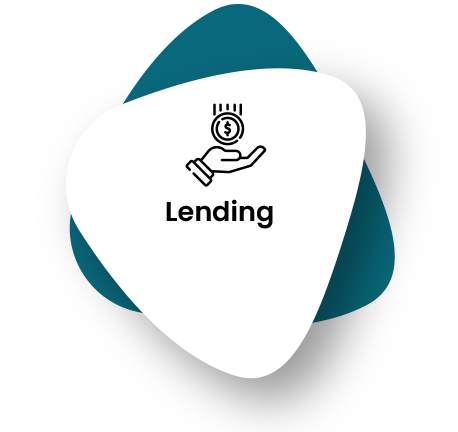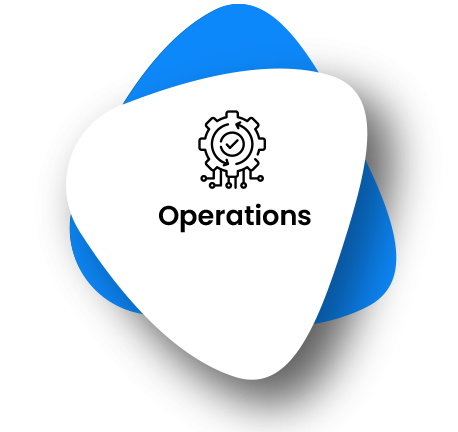Generative AI in Banking and Financial Services
January 31, 2024

ChatGPT's debut on November 30, 2022, set off a substantial global reaction. Impressively, within two months, the platform garnered over 100 million active users worldwide, outpacing the growth rate of other platform innovations. Soon after, several competitors followed the suit to roll out their own iterations of what is now commonly referred to as Generative AI (GenAI).
AI's journey in banking commenced around a decade ago, and since then, it has matured significantly. From customer service to personalized finance, fraud detection, and credit scoring to operations, AI has found its place in various domains of the banking industry. Today, almost all the banks have their virtual assistance as the first mode of interaction for their customers.
GenAI takes this experience to the next level by accelerating decision-making, streamlining operations, reducing the risks, and providing better customer experience. GenAI is no less than a ‘magic wand’ that can be waved to repurpose itself as per a variety of banking and financial requirements.
According to one of the Gartner surveys, nearly 70% of financial services leaders reported that GenAI tools have the potential for benefits rather than risks for their organization. Below a few snippets of how various banks and financial institutions are leveraging GenAI:
Capital One and JPMorgan Chase have leveraged GenAI to augment their AI-powered fraud and suspicious activity detection systems. This effort consequently led to a significant reduction in false positives, a better detection rate, reduced costs, and enhanced customer satisfaction.
Morgan Stanley Wealth Management will use OpenAI’s technology to leverage its own vast data sources to assist financial advisors with insights into companies, sectors, asset classes, capital markets, and regions worldwide.
Wells Fargo is building capabilities to automate document processing, including providing summary reports, and scaling up its virtual assistant chatbots.
Goldman Sachs and Citadel are considering GenAI applications for internal software development and information analysis.
With 25 years of experience helping our customers build innovative solutions in Banking and Financial Services (BFS), Innova Solutions is steering the “Extreme design” approach in digital banking solutions. From South Korea in the east to Mexico in the west, our 200+ customers are growing across 15+ countries globally. Six of the top 10 global BFS companies are our customers.
Innova's distinctive AI Everywhere Solution assists banks and financial institutions in streamlining their digital transformation and elevating customer experiences to outshine their competitors. Innova Solutions has defined the below four fundamental themes as a strategic guide for adopting GenAI, presenting a route to future success:




GenAI Empowers Banks to Offer Customers with an Unparalleled Level of Service and Experience
AI can optimize customer experiences across their lifecycles, including acquisition, engagement, and retention. From marketing initiatives and lead generation to personalization and product recommendations, AI empowers banks to provide tailored services to their customers.
GenAI personalizes banking services by analyzing customer data, lifestyle information, and financial goals and offers bespoke/customized investment options, savings plans, and loan solutions in real-time. AI continually refines recommendations, ensuring that the advice remains relevant and aligned with changing circumstances, which enhances customer engagement and increases cross-selling opportunities for enterprises.
The banking field relies heavily on a sizeable pool of service representatives, including call-center agents and financial advisers specializing in wealth management. Today GenAI is being considered to help these front desk teams quickly analyze massive volumes of historical and real-time data to predict market trends and provide better suggestions to their clients.
The predictive analytical capabilities of GenAI helps in risk assessment, portfolio optimization, market monitoring, and sentiment analysis. For example, Morgan Stanley is building an AI assistant using GPT-4, with the aim of helping tens of thousands of wealth managers quickly find and synthesize answers from a massive internal knowledge base. The model combines search and content creation allowing wealth managers to find and customize information for any client at any time, ultimately enhancing response time and providing better customer experience.
Case Study
Innova Solutions leveraged Contact Center insights and analytics to improve customer service for a multinational investment bank. Our AI Everywhere solutions for enhanced customer experience enabled the capture and automation of actionable data, trends, indicators, and insights from customer communications and interactions resulting in improved customer service while monitoring agents’ performance.
Overall the solutions helped in: Reducing call wait times and average call handle time, Quick questions routing the inquiries to the appropriate agent, Decreased time to resolution, Reduced costs via self-service technologies, Increased amounts of high-quality insights on customer satisfaction, potential product issues.
Risk management and compliance find a key ally in GenAI. Its role is pivotal in shaping any efforts related to fraud prevention, beginning well before customer onboarding. Whether it's the onboarding of new clients or the approval of new services for existing clients, due diligence is an important component of fraud prevention. During the Know Your Customer (KYC) process, GenAI stands out as an invaluable asset, conducting a detailed analysis of extensive onboarding documents and presenting comprehensive summaries that outline potential risks associated with individual customers.
According to the Nilson Report, payment card fraud losses worldwide exceeded $32 billion in 2021, of which nearly $12 billion was in the US. Over the next 10 years, the industry is projected to lose an accumulated $397 billion worldwide, with $165 billion coming from the US.
Traditional rule-based AI systems and statistical models struggle to deal with such intricate and ever-changing fraud tactics. GenAI offers a more robust solution by comprehending the typical transaction distribution and highlighting any deviations from this norm .
Advancements in Financial Crimes (FinCrime) Mitigation Takes a Leap Forward With the Integration of GenAI
Current state financial transactions happen at a lightning speed, and the battle against financial crime must keep pace. Recent research by LexisNexis Risk Solution’s revealed that the worldwide financial crime compliance costs for financial institutions have reached $206.1 billion, with 98% of the institutions reporting an increase in such costs during the last one year.
As banks transition to real-time payments (RTP), they require advanced solutions for proactive financial crime management. RTP supports a variety of payment dynamics including Person-to-person (P2P), Government to Consumer (G2C) in terms of subsidies, tax refunds / rebates, pensions, social benefits, or Consumer to Business (C2B) transactions such as Point of sale transactions, bill payments, medical co-pays and others. Such an extensive range of payment dynamics brings its along own complexities, threats, and frauds.
While AI is critical for identifying and preventing fraudulent activities in the banking sector, GenAI helps in mitigating such frauds by utilizing the power of predictive models, real-time detection, alert management, and anomaly detection combine to ensure the security of digital transactions.
Case Study
Innova Solutions developed a fraud management solution for a large financial institution with real-time consumer identity analytics, authentication, and investigative insights, focusing on: Detecting, alerting, and blocking complex fraudulent transactions, streamlining account opening, minimizing customer friction for authentication, countering emerging fraud threats, reducing fraud losses and reputational risk.
Our solution saved the fraud management time by 90% and resulted in 85% fewer fraud claims.
Leveraging GenAI to Expedite Credit Scoring and Lending Process
AI significantly improves credit scoring and lending processes. The ability of AI to analyze vast amounts of data enhances risk assessments and forecasts the creditworthiness of borrowers. This includes data from credit reports, social media, income, debt ratios, and transaction patterns. By automating these processes, AI reduces default rates and improves the efficiency of lending decisions.
In terms of regulatory guidelines, the importance of responsible and ethical AI deployment, data privacy, fair lending, risk management, ethical AI usage, model validation, and alignment with regulatory authorities cannot be overstated. These guidelines are critical to establish a secure and well-regulated financial environment.
GenAI Helps Banks Reduce Operational Costs and Save Billions of Dollars
AI streamlines processes, reducing operational costs for banks. By increasing transaction volumes while maintaining the same headcount, AI automation can lead to significant cost savings. According to a McKinsey report, the Banking and Financial services industry is projected to save between ~$200bn and $340bn every year by utilizing GenAI capabilities!
Banks leverage AI to automate routine tasks, freeing up human resources to focus on more complex roles. AI enhances various operational aspects, such as client onboarding, underwriting, payment processing, reconciliation, and credit risk analysis. Not just that, GenAI has a variety of use cases in bank’s back-office tech operations as well, including produce codes, application support, UI generation, app modernization, and many more.
By extracting relevant information from various sources and presenting it in an organized manner, GenAI can help banks automate the creation of investment research reports. For example, Citigroup is planning to grant generative artificial intelligence to the vast majority of its over 40,000 coders. Such integration will make their workforce more sufficient. Like when federal regulators dropped 1,089 pages of new capital rules on the US banking sector, Citigroup used GenAI to go through the document word by word.
Imperative Regulations for GenAI Adoption to Win Confidence in the Mainstream
According to a BCG report, more than 50% of the global executives still discourage the adoption of GenAI. Some of their major concerns were compromised personal data privacy, higher vulnerabilities of hacking, biases in decision-making, and increased carbon footprints among others.
There is a significant space for a constructive dialogue between government bodies and organizations to strategize the integration of AI, particularly Generative AI (GenAI), into mainstream activities. This can be accomplished by building AI regulations that not only identify and address potential biases and loopholes in the decision processes but also provide an oversight to ensure the ethical use of GenAI.
Governments and regulatory bodies have already begun with their work in these areas. The US government has demanded that AI be regulated in the country, and seven AI companies have agreed to voluntarily comply with the safety standards for AI. Similarly, the Australian Government, released a discussion paper earlier this year that provides an overview of the global approaches to the regulation of artificial intelligence (AI), and invites contribution from the industry in determining whether the existing regulatory environment is satisfactory.
GenAI models use high computing powers adding to more carbon footprints. There are also potential regulations needed to ensure environmental sustainability.

Conclusion
While GenAI opens a lot of opportunities for banking and financial institutions, there are a few challenges associated with its implementation in the banking systems such as adapting traditional business models, the fragmented nature of data across entities and lines of business, and the evolving nature of AI technology and integration with legacy systems.
To harness the full potential of AI in this dynamic area, banking professionals must adapt to these changes by developing a range of technical, analytical, and management skills.


